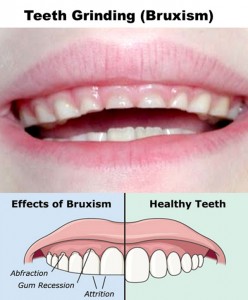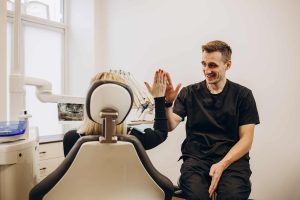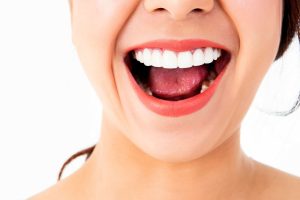Have you ever woken up with a headache?
Does your partner complain that you make loud cracking noises at night?
Then you may be one of the 80% of people who grind their teeth.
Tooth grinding is one of the most under-diagnosed problems in dentistry, and a major cause of facial pain, deterioration of teeth, and sleep problems.
With this is in mind, here is a full guide to what tooth grinding is, what causes it, and how it can be prevented.
Lets go:
What is tooth grinding?
Tooth grinding is the act of involuntarily rubbing or grinding your top teeth against your bottom teeth.
This grinding usually occurs when you are asleep, or when you are preoccupied with a certain activity.
In short — tooth grinding happens unconsciously.
Tooth grinding is related to jaw clenching, which is where you clamp your teeth hard together, but don’t actually grind.
Chronic tooth grinding, to the point where it damages your teeth, is called bruxism.
 Tooth grinding usually happens at night, but can occur when one is awake as well
Tooth grinding usually happens at night, but can occur when one is awake as well
What causes chronic tooth grinding?
The amount that someone grinds their teeth is caused by both genetic and environmental factors.
One important genetic factor behind the likelihood of us grinding our teeth is our straight our teeth are
The less straight your teeth are, the more likely you are to grind.
People with misaligned bites, such as an overbite, under-bite or crossbite are particularly likely to grind their teeth.
Similarly, the natural resting levels of activity in your jaw muscles affect how likely you are to grind your teeth.
Hyperactive jaw muscles increase your chances of tooth grinding.
There are a multitude of environmental and behavioural factors that contribute to the likelihood of bruxism.
These include:
1) Stress- this is the biggest environmental cause of tooth grinding, and been very well established in clinical science.
The link between stress and bruxism means that people often grind their teeth during exam periods, or difficult spells at work.
It is thought that stress and anxiety contributes to one grinding their teeth due to the affect of the hormones adrenaline and norepinephrine on our reflexes.
These hormones, which are secreted at a higher level in stressful situations, increase the frequency of these reflexive actions.
 Bruxism can occur during stressful periods like exam time
Bruxism can occur during stressful periods like exam time
Additionally, chronic stress can lead to an imbalance in these hormones that can put someone at an even higher risk of developing bruxism.
This stress-induced tooth grinding can disappear once the stressful stimulus has ended, but it can become habituated over this period.
This can lead to chronic tooth grinding, along with all the problems that come along with it.
2) Stimulant use- this can range from caffeine and nicotine, to illegal stimulant drugs.
Stimulant drugs increase the propensity for someone to grind their teeth as they promote your body’s reflexive movements.
If you smoke cigarettes in the evening before bed, then you are at much higher risk of grinding your teeth when asleep
 Smoking cigarettes can increase your likelihood of tooth grinding
Smoking cigarettes can increase your likelihood of tooth grinding
3) Use of SSRI anti-depressants- these include the three most commonly prescribed anti-depressant drugs in the UK: Citalopram (Celexa), Fluoxetine (Prozac) and Sertraline (Zoloft).
SSRI drugs increase the amount of serotonin in the brain.
Raised levels of serotonin have been correlated with an increased likelihood of jaw clenching and teeth grinding, although the mechanism for this is not properly understood.
 SSRI anti-depressant use can promote tooth grinding
SSRI anti-depressant use can promote tooth grinding
The link between SSRI use and tooth grinding is worrying particularly given the rise in anti-depressant use among young people.
Tooth grinding triggered by SSRI use can become habituated, and thus persist even after the anti-depressants in question are discontinued.
This can mean that young people can develop chronic tooth grinding as a result of taking these anti-depressants.
[ps2id id=’symptoms’ target=”/]
4) Dehydration– this is a particular problem for people who drink alcohol at night, or during warm weather.
Make sure you drink enough water, especially at night.
It is also worthwhile to keep an eye on how much water your children are drinking, as dehydration is a big cause of tooth grinding in children.
What are the signs and symptoms of tooth grinding?
As tooth grinding is a reflex action that often occurs at night, many may be unaware that they do it.
There are, however, some tell-tale signs that you grind your teeth.
These include:
1) Regular headaches and facial pain
Tooth grinding puts a lot of strain on the muscles in the top of your jaw.
This can cause pain that radiates around your head, particularly at the sides of your head.
 Tooth grinding can cause facial pain and headaches
Tooth grinding can cause facial pain and headaches
It can also cause pain around your cheeks and mouth.
Tooth grinding can also cause damage inside your mouth, to your lips and the inside of your cheeks.
If you experience this pain regularly, particularly in the morning, then it may be a sign that you grind your teeth.
2) Making loud noises at night
Grinding your teeth can make a very loud, often unpleasant creaking or crunching noise.
This noise can be loud enough to wake up your partner and severely disrupt their sleep.
Having your partner complain about these kinds of noises may indicate that you grind your teeth at night.
It may also be indicative of other sleep disorders such as sleep apnoea<link>, so it could be worth running tests for those problems too.
3) Worn down teeth
One of the most damaging effects of tooth grinding is that it wears down your teeth over time.
This can make your smile less aesthetically pleasing, as shorter teeth can lead to a “gummy smile”, but can also make teeth more likely to crack and chip.
 Bruxism can wear down your teeth and make them appear small
Bruxism can wear down your teeth and make them appear small
The wearing down of teeth, particularly in people who are not elderly, is almost always due to tooth grinding.
Therefore, if you notice that your teeth are wearing down, it is definitely worth seeing your dentist.
4) Having sensitive teeth
Tooth grinding can cause sensitive teeth by wearing away our teeth’s protective enamel layer.
Enamel wear can cause our teeth to be sensitive to hot, cold and sweet foods. In severe cases, even breathing in cold air (on a winters day for example) can cause pain.
Although tooth sensitivity can be caused by tooth grinding, it can have a number of other causes too.
It is therefore worth asking your dentist about the possibility of tooth grinding if you have tooth sensitivity in conjunction with some of the other symptoms listed.
5) Sleep problems & fatigue
The discomfort of grinding your teeth can cause you to wake up intermittently at night.
These periods of wakefulness often only last for a few seconds, and can go unnoticed and unremembered.
However as these rapid awakenings break up the sleep cycle, they can cause sleepiness during the day.
This daytime fatigue can cause irritability, reduced performance at work, and increase the likelihood of road traffic accidents.
6) Increased frequency of dental problems
As well as wearing down your tooth enamel, bruxism can damage your teeth in other ways.
The repetitive physical trauma of tooth grinding can lead to cracks and chips in your teeth. This may require treatments such as fillings and crowns to fix.
 Grinding your teeth can lead to chips
Grinding your teeth can lead to chips
The impact of teeth rubbing against each other repetitively can also break crowns off and dislodge fillings, both of which will need to be repaired by a dentist.
If you are having more dental problems than usual, and there is no clear reason for this, then a dentist should check if you grind your teeth.
7) Temporomandibular Jaw (TMJ) Disorder
TMJ Disorder is chronic stiffness and pain in the joints that connect the jawbones together.
This can result in severe pain, and an inability to open your mouth properly.
Tooth grinding puts strain on the muscles, ligaments and tendons that control your jaw. Chronic, repetitive tooth grinding can damage this soft tissue in your jaw and lead to TMJ pain.
 TMJ can damage the bones and connective tissue in your jaw.
TMJ can damage the bones and connective tissue in your jaw.
Only severe tooth grinding will lead to TMJ, however it is by far the most common cause of this disorder.
Mild TMJ pain can be treated at home, however more severe TMJ disorder may require medical intervention or even surgery to be treated.
If you have more than one of these symptoms then it is well worth going to your dentist, and asking if they can check if you are grinding your teeth.
Such a check should be able to be performed quickly and easily by a dentist.
It should not take longer than a regular check up, nor cost any more than one.
How do you treat tooth grinding?
By far the most effective way to treat tooth grinding is by wearing a specialized sleeping appliance at night.
These sleeping appliances are similar to a mouth guard, and are small and comfortable enough to be work without disrupting sleep.
 Tooth grinding appliances are small and thin enough to be worn comfortably during sleep
Tooth grinding appliances are small and thin enough to be worn comfortably during sleep
They work by adjusting your bite to its optimal resting position to stop grinding.
Additionally, the hard acrylic that the appliance is made out of also acts as a shock absorber to reduce any damage to your teeth and mouth that may be caused by what little grinding you do.
The appliance is made by a dental technician, and is fine-tuned and fitted by a dentist.
This usually is done over two appointments, one to take the impression for the technician to make the appliance, and the other to fit the appliance.
Almost all dental practitioners agree that this is the most effective way to stop tooth grinding, especially at night
What else can I do to stop tooth grinding?
There are other ways of minimizing tooth grinding, these are usually through reducing the risk factors associated with bruxism.
As tooth grinding is less common in people with straighter teeth, orthodontic treatment can reduce tooth grinding.
Similarly, missing or broken teeth can interfere with your bite and lead to an increase in the likelihood of tooth grinding. Therefore fixing these problems with dental implants or crowns may reduce the amount you grind your teeth.
Tooth grinding can also be reduced by becoming more conscious about and how tense your jaw is at rest.
Many people carry more tension in their jaw then they realise.
Focussing on relaxing your jaw through certain exercises and sustained periods of conscious relaxation of your jaw muscles can reduce the level of tension you carry in your jaw and reduce tooth grinding.
Cutting out habits that promote jaw tension, such as chewing gum, can also help you relax your jaw.
Magnesium supplements can help relax the small, fast twitch muscles in your jaw and reduce grinding further.
 Taking magnesium supplements daily can help reduce tooth grinding
Taking magnesium supplements daily can help reduce tooth grinding
Finally, as stimulant drugs and stress are major contributors to bruxism, it is advisable that you try to reduce stress and your intake of caffeine and nicotine if you want to grind your teeth less.
How to reduce tooth grinding in children?
Although tooth grinding is more common in adults than in children, it is estimated that around 20% of children grind their teeth.
It can be hard to get children to wear a sleeping appliance.
However, as the tooth grinding behaviour is likely to be newer in a child than in an adult, it can be easier to unteach this harmful behaviour before it becomes further habituated.
Common childhood habits such as thumb sucking and using a pacifier can lead to tooth grinding, as a child becomes used to having pressure against their teeth.
Such behaviour should therefore be avoided.
 Thumb and finger sucking can encourage tooth grinding in young children
Thumb and finger sucking can encourage tooth grinding in young children
Similarly, parents should try and identify and remove any stimuli that may provoke stress in a child, as this is the biggest environmental cause of bruxism, even in children.
Why do we grind our teeth?
There is still debate in the dental academic community as to why we grind our teeth.
The current thinking, however, is that tooth grinding is a reflex action.
It therefore occurs involuntarily, much like blinking or breathing.
It is thought that this reflex developed for evolutionary reasons.
We all have an optimal bite, which is the best position for our top and bottom teeth to contact each other in order to minimize damage to teeth and soft palette.
If the sharp parts of our teeth are exposed, for example, we may accidentally damage our cheeks lips or tongues.
Unfortunately, due to the imperfections of nature, most of us do not achieve this optimal bite at rest.
We therefore move our teeth when our mouth is closed in order to try to come to a natural bite.
When some of our teeth are in this optimal position, some of our other teeth are hopelessly misaligned.
This then causes us to move our teeth again to get the misaligned teeth back into the optimal position.
We move our teeth back and forth against each other to achieve this partial alignment — thus grinding our teeth.




